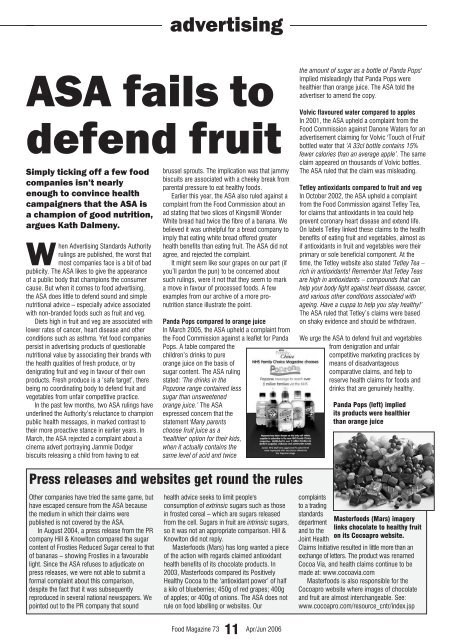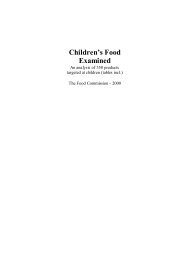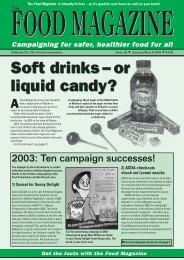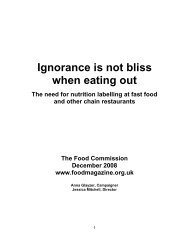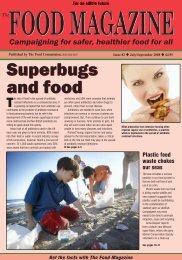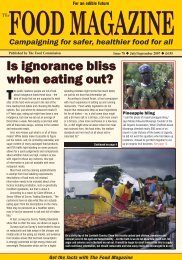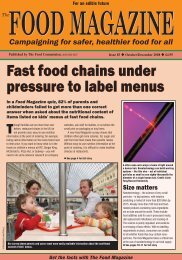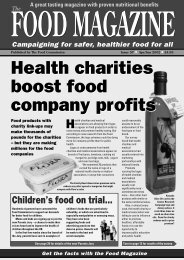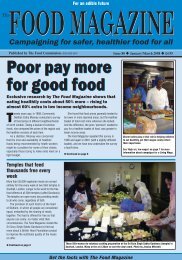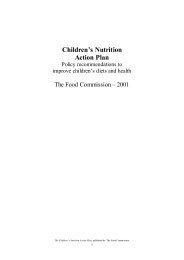Campaigning for safer, healthier food for all - The Food Commission
Campaigning for safer, healthier food for all - The Food Commission
Campaigning for safer, healthier food for all - The Food Commission
Create successful ePaper yourself
Turn your PDF publications into a flip-book with our unique Google optimized e-Paper software.
advertising<br />
ASA fails to<br />
defend fruit<br />
Simply ticking off a few <strong>food</strong><br />
companies isn’t nearly<br />
enough to convince health<br />
campaigners that the ASA is<br />
a champion of good nutrition,<br />
argues Kath Dalmeny.<br />
When Advertising Standards Authority<br />
rulings are published, the worst that<br />
most companies face is a bit of bad<br />
publicity. <strong>The</strong> ASA likes to give the appearance<br />
of a public body that champions the consumer<br />
cause. But when it comes to <strong>food</strong> advertising,<br />
the ASA does little to defend sound and simple<br />
nutritional advice – especi<strong>all</strong>y advice associated<br />
with non-branded <strong>food</strong>s such as fruit and veg.<br />
Diets high in fruit and veg are associated with<br />
lower rates of cancer, heart disease and other<br />
conditions such as asthma. Yet <strong>food</strong> companies<br />
persist in advertising products of questionable<br />
nutritional value by associating their brands with<br />
the health qualities of fresh produce, or by<br />
denigrating fruit and veg in favour of their own<br />
products. Fresh produce is a ‘safe target’, there<br />
being no coordinating body to defend fruit and<br />
vegetables from unfair competitive practice.<br />
In the past few months, two ASA rulings have<br />
underlined the Authority’s reluctance to champion<br />
public health messages, in marked contrast to<br />
their more proactive stance in earlier years. In<br />
March, the ASA rejected a complaint about a<br />
cinema advert portraying Jammie Dodger<br />
biscuits releasing a child from having to eat<br />
brussel sprouts. <strong>The</strong> implication was that jammy<br />
biscuits are associated with a cheeky break from<br />
parental pressure to eat healthy <strong>food</strong>s.<br />
Earlier this year, the ASA also ruled against a<br />
complaint from the <strong>Food</strong> <strong>Commission</strong> about an<br />
ad stating that two slices of Kingsmill Wonder<br />
White bread had twice the fibre of a banana. We<br />
believed it was unhelpful <strong>for</strong> a bread company to<br />
imply that eating white bread offered greater<br />
health benefits than eating fruit. <strong>The</strong> ASA did not<br />
agree, and rejected the complaint.<br />
It might seem like sour grapes on our part (if<br />
you’ll pardon the pun) to be concerned about<br />
such rulings, were it not that they seem to mark<br />
a move in favour of processed <strong>food</strong>s. A few<br />
examples from our archive of a more pronutrition<br />
stance illustrate the point.<br />
Panda Pops compared to orange juice<br />
In March 2005, the ASA upheld a complaint from<br />
the <strong>Food</strong> <strong>Commission</strong> against a leaflet <strong>for</strong> Panda<br />
Pops. A table compared the<br />
children’s drinks to pure<br />
orange juice on the basis of<br />
sugar content. <strong>The</strong> ASA ruling<br />
stated: ‘<strong>The</strong> drinks in the<br />
Popzone range contained less<br />
sugar than unsweetened<br />
orange juice.’ <strong>The</strong> ASA<br />
expressed concern that the<br />
statement 'Many parents<br />
choose fruit juice as a<br />
'<strong>healthier</strong>' option <strong>for</strong> their kids,<br />
when it actu<strong>all</strong>y contains the<br />
same level of acid and twice<br />
the amount of sugar as a bottle of Panda Pops'<br />
implied misleadingly that Panda Pops were<br />
<strong>healthier</strong> than orange juice. <strong>The</strong> ASA told the<br />
advertiser to amend the copy.<br />
Volvic flavoured water compared to apples<br />
In 2001, the ASA upheld a complaint from the<br />
<strong>Food</strong> <strong>Commission</strong> against Danone Waters <strong>for</strong> an<br />
advertisement claiming <strong>for</strong> Volvic 'Touch of Fruit'<br />
bottled water that ‘A 33cl bottle contains 15%<br />
fewer calories than an average apple’. <strong>The</strong> same<br />
claim appeared on thousands of Volvic bottles.<br />
<strong>The</strong> ASA ruled that the claim was misleading.<br />
Tetley antioxidants compared to fruit and veg<br />
In October 2002, the ASA upheld a complaint<br />
from the <strong>Food</strong> <strong>Commission</strong> against Tetley Tea,<br />
<strong>for</strong> claims that antioxidants in tea could help<br />
prevent coronary heart disease and extend life.<br />
On labels Tetley linked these claims to the health<br />
benefits of eating fruit and vegetables, almost as<br />
if antioxidants in fruit and vegetables were their<br />
primary or sole beneficial component. At the<br />
time, the Tetley website also stated ‘Tetley Tea –<br />
rich in antioxidants! Remember that Tetley Teas<br />
are high in antioxidants – compounds that can<br />
help your body fight against heart disease, cancer,<br />
and various other conditions associated with<br />
ageing. Have a cuppa to help you stay healthy!’<br />
<strong>The</strong> ASA ruled that Tetley’s claims were based<br />
on shaky evidence and should be withdrawn.<br />
We urge the ASA to defend fruit and vegetables<br />
from denigration and unfair<br />
competitive marketing practices by<br />
means of disadvantageous<br />
comparative claims, and help to<br />
reserve health claims <strong>for</strong> <strong>food</strong>s and<br />
drinks that are genuinely healthy.<br />
Panda Pops (left) implied<br />
its products were <strong>healthier</strong><br />
than orange juice<br />
Press releases and websites get round the rules<br />
Other companies have tried the same game, but<br />
have escaped censure from the ASA because<br />
the medium in which their claims were<br />
published is not covered by the ASA.<br />
In August 2004, a press release from the PR<br />
company Hill & Knowlton compared the sugar<br />
content of Frosties Reduced Sugar cereal to that<br />
of bananas – showing Frosties in a favourable<br />
light. Since the ASA refuses to adjudicate on<br />
press releases, we were not able to submit a<br />
<strong>for</strong>mal complaint about this comparison,<br />
despite the fact that it was subsequently<br />
reproduced in several national newspapers. We<br />
pointed out to the PR company that sound<br />
health advice seeks to limit people's<br />
consumption of extrinsic sugars such as those<br />
in frosted cereal – which are sugars released<br />
from the cell. Sugars in fruit are intrinsic sugars,<br />
so it was not an appropriate comparison. Hill &<br />
Knowlton did not reply.<br />
Master<strong>food</strong>s (Mars) has long wanted a piece<br />
of the action with regards claimed antioxidant<br />
health benefits of its chocolate products. In<br />
2003, Master<strong>food</strong>s compared its Positively<br />
Healthy Cocoa to the ‘antioxidant power’ of half<br />
a kilo of blueberries; 450g of red grapes; 400g<br />
of apples; or 400g of onions. <strong>The</strong> ASA does not<br />
rule on <strong>food</strong> labelling or websites. Our<br />
complaints<br />
to a trading<br />
standards<br />
department<br />
and to the<br />
Joint Health<br />
Master<strong>food</strong>s (Mars) imagery<br />
links chocolate to healthy fruit<br />
on its Cocoapro website.<br />
Claims Initiative resulted in little more than an<br />
exchange of letters. <strong>The</strong> product was renamed<br />
Cocoa Via, and health claims continue to be<br />
made at: www.cocoavia.com<br />
Master<strong>food</strong>s is also responsible <strong>for</strong> the<br />
Cocoapro website where images of chocolate<br />
and fruit are almost interchangeable. See:<br />
www.cocoapro.com/resource_cntr/index.jsp<br />
<strong>Food</strong> Magazine 73 11<br />
Apr/Jun 2006


